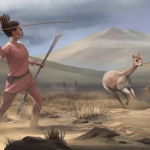The popular paleo diet, which advocates a meat-rich diet to mimic the eating habits of ancient humans, is being examined in light of a recent study led by Randy Haas, assistant professor of anthropology at the University of Wyoming.
Contrary to the prevailing view that the early human economy placed a high emphasis on hunting, a recent study of the remains of ancient humans in the Peruvian Andean Altiplano, some 9,000 years ago, shows that their diet consisted mainly of vegetable material.
Lead researcher Randy Haas challenges the conventional wisdom that early humanity’s economy focused primarily on hunting, leading to trends toward high-protein diets such as the paleo diet. Haas says: “Our analysis shows that the diet was 80% plant material and 20% meat. »
The study confronts the conservation bias that often distorts assumptions about meat-based diets in ancient populations due to the better preservation of animal bones. Ceren Kabukcu, an archaeobotanist from the University of Liverpool, highlights this bias and emphasizes the need to reconsider perspectives on ancient diets.
Using modern analytical techniques, including mass spectrometry, the research team examined the bones of individuals from Wilamaya Patjxa and Soro Mik’aya Patjxa in Peru. Contrary to the initial hypothesis of a mainly meat-based diet, the study found that this mobile foraging group consumed between 70 and 95 percent plant material, with tubers playing an important role.
Herman Pontzer, professor of evolutionary anthropology at Duke University, emphasizes the importance of recognizing the diversity of prehistoric diets. He rejects a singular view of the paleo diet and calls for a move away from a one-size-fits-all approach to ancient diets.
The study challenges the popular paleo diet model and advocates a diet high in meat and low in carbohydrates. Adaptations such as the Pegan diet have emerged, but these are not supported by anthropological evidence. Pontzer emphasizes the need to recognize the diversity of prehistoric diets, citing the different eating habits of different populations.
Read More: New study AI system can predict when you will die
The study ends with a call to recognize the diversity of prehistoric diets and emphasizes the importance of abandoning rigid dietary patterns without anthropological support. It emphasizes the ability of early humans to adapt to their environment, engaging in a mix of hunting and gathering rather than adhering to a particular dietary narrative.











